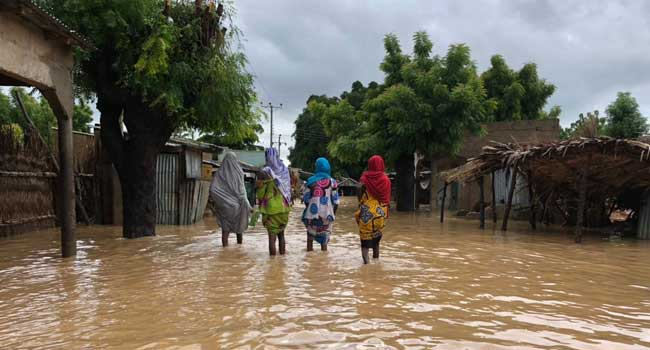Flooding :FG Blames Poor Preparation as more states experience Surge

Several states across the country have continued to experience severe flooding as the Federal Government on Saturday faulted state governments for not heeding early warnings issued by its agencies.
Thousands have been displaced in states such as Anambra, Katsina, Nasarawa, Rivers, Bayelsa, Kogi, and Jigawa in recent weeks.
According to the National Emergency Management Agency (NEMA), over 300 people have been killed by devastating floods in 2022.
Speaking on Channels Television’s Sunrise on Saturday, Director-General of the Nigeria Hydrological Services (NIHSA), Clement Nze, blamed state governments for disregarding “adequate and timely warnings” and weather advisories issued by the various Federal Government agencies
“If our predictions were heeded by relevant sub-nationals, we will not have been where we are today,” Eze said.
“But I am believing that following this year’s flood disaster across the land, the consciousness of relevant actors especially sub-nationals will be awakened to do the needful once they receive all these advisories.”
He also said the Minister of Water Resources, Suleiman Adamu, earlier in the year wrote letters to state governors informing them of the impending devastating floods of 2022 but some of the governors did not heed the warning.
“They (weather predictions) were out early enough to set the tone for what to expect in the course of the year,” Nze said. “The Nigerian Meteorological Agency came out on February 15 to paint the picture of what to expect and my own agency, Nigeria Hydrological Services, later followed suit.
“The Minister of Water Resources that gave the unveiling of the prediction, the annual flood outlook, issued warnings, issued letters to each state government in Nigeria and relevant ministries like agriculture, environment and aviation, informing them the specific locations in their states they should watch out for during the rainy season.
“The letters were authored by him (minister), signed and sent to the governors, they were informed and the necessary measures they ought to take.”
Presidential intervention?
Meanwhile, President Muhammadu Buhari on Friday met with Governors in Abuja over the flooding disasters.
The President encouraged the Governors to meet with the Minister of Water Resources to fashion out solutions.
Special intervention funds, the President added, may be arranged after consultations with the minister.
Flooded rice farm
The flooding in Nasarawa state affected one of the nation’s largest rice farms, which may lead to an increase in the staple ahead of the festive season.
In a chat with Channels Television, the farm’s Chief Agronomist, Dr Umar Ismaila, said more than 4,000 hectares of farmland has been submerged due to the floods.
Dr Umar said the incident will have an implication on Nigeria’s food security.
Counting the losses, the farm’s business head and Vice President Olam rice farm, Anil Nair, said in a statement that the losses are huge but can only be estimated once the water recedes.
“OLAM rice farm in Rukubi, Doma local government area of Nassarawa state is seated on a thirteen thousand, five hundred (13,500) hectares land and operates a crop area of four thousand, four hundred (4500) hectares,” the statement said.
“It is the largest rice farm with the state-of-the-art equipment in Africa.”
Lokoja-Abuja highway
As of Thursday, the Lokoja-Abuja expressway was besieged by flooding, forcing the Federal Road Safety Corps to issue a diversion notice.
According to the agency, the flooding has “impeded the free flow of traffic” on the expressway.
It advised travellers to instead “take the Suleja-Bida-Mokwa road, while those travelling to the South-South/South-East regions are also advised to go through Nasarawa-Oweto Bridge-Adoka-Otupka axis.”
The FRSC noted that the diversion was necessary “due to the fact that the water level may take another two or more days to subside.”
Many communities in Kogi State have also been sacked by flooding.
Climate change
Much of the flooding has been attributed to heavy rains and the release of dam water in neighboring Cameroon.
However, experts believe the failure to adequately prepare for climate change has worsened the disaster





